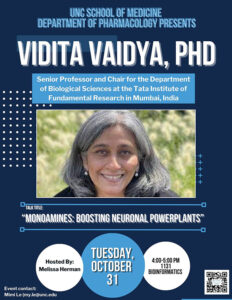
- This event has passed.
Dr. Vidita Vaidya of the Tata Institute of Fundamental Research presents
October 31, 2023 @ 4:00 pm - 5:00 pm

Vidita Vaidya, PhD.
Senior Professor
Department of Biological Sciences
Tata Institute of Fundamental Research
Title of Talk: “Monoamines: Boosting Neuronal Powerplants”
This seminar will be in 1131 Bioinformatics.
Please join us and show support for our seminar speakers!
(For those unable to attend, a zoom link is available upon request to MiMi Le.)
Host: Melissa Herman
From Dr. Vaidya’s website:
About Dr. Vaidya
Vidita Vaidya received her undergraduate degree from St. Xavier’s College, Mumbai in Life-Science and Biochemistry. She obtained her PhD in Neuroscience at Yale University in the lab of Prof. Ronald Duman. Her postdoctoral work was done at the Karolinska Institute in Sweden with Prof. Ernest Arenas and at the University of Oxford in the UK with Prof. David Grahame-Smith. She joined the Department of Biological Sciences, TIFR, as a faculty member in March 2000. Her research group’s work has been recognized by the National Bioscientist Award in 2012, the Shanti Swarup Bhatnagar Award in Medical Sciences in 2015, and the Infosys Prize in Life Sciences in 2022. In 2019, Vidita received the Nature Award for Mentoring in Science in the mid-career category and in 2021 the JC Bose National Fellowship from the Science and Engineering Research Board (SERB). Vidita is a Fellow of the Indian National Science Academy (INSA), the National Academy of Sciences, India (NASI) and the Indian Academy of Sciences (IAS), as well as a Distinguished Visiting Professor at the Indian Institute of Technology – Bombay. When not in the lab, Vidita moonlights as an avid storyteller, frequent traveler, and a scientific outreach enthusiast. Vidita is committed to enhancing equity and diversity in academia, and working to break down the barriers that prevent academic working environments from being inclusive spaces.
The Neurobiology of Emotion: Research Focus
“Life experiences have a profound impact on the brain. Our lab is interested in (1) understanding the neurocircuitry of emotion, (2) its modulation by life experience and mood modulatory drugs (serotonergic psychedelics and pharmacological antidepressants), and (3) the alterations in emotional neurocircuitry that underlie complex psychiatric disorders like anxiety, depression, and schizophrenia. Using animal models of psychiatric vulnerability, in particular those that are based on perturbations of early life experience, we study the molecular, epigenetic, cellular, bioenergetic, and functional changes that contribute to long-lasting alterations in behavior. We explore the importance of early critical periods in setting up vulnerability or resilience to psychopathology by using environmental, pharmacological, genetic, or chemogenetic (DREADDs) perturbations. We are interested in the changes that arise in the development of stress neurocircuitry thus directly impacting adult stress responses, and generating a substrate for vulnerability or resilience to psychopathology. Our studies have focused on the role of serotonin (5-HT) and the Gq-coupled 5-HT2A receptor in contributing to behavioral alterations and cellular changes in limbic neurocircuitry observed in animal models of psychiatric vulnerability. We also study the modulation of bioenergetics within neurocircuits that modulate mood, in particular the relevance of mitochondrial biogenesis and function in the etiology and treatment of mood disorders. Our work addresses the relationship between early stress, neuroinflammation, and mitochondrial dysfunction in psychopathology as well as aging. We also investigate the molecular and cellular adaptations that arise from sustained antidepressant treatment including fast-acting antidepressant therapies. Amongst these adaptations is the regulation of adult neural stem cells and in neuronal cytoarchitecture in key limbic neurocircuits. We are interested in the pathways that regulate these neuroplastic changes and their contribution to mood-related behavior. We use pharmacological and genetic approaches, and tools spanning molecular, cell biological, and behavioral studies to understand the neurocircuitry of emotion.” ~https://www.hutmentlab.com/

